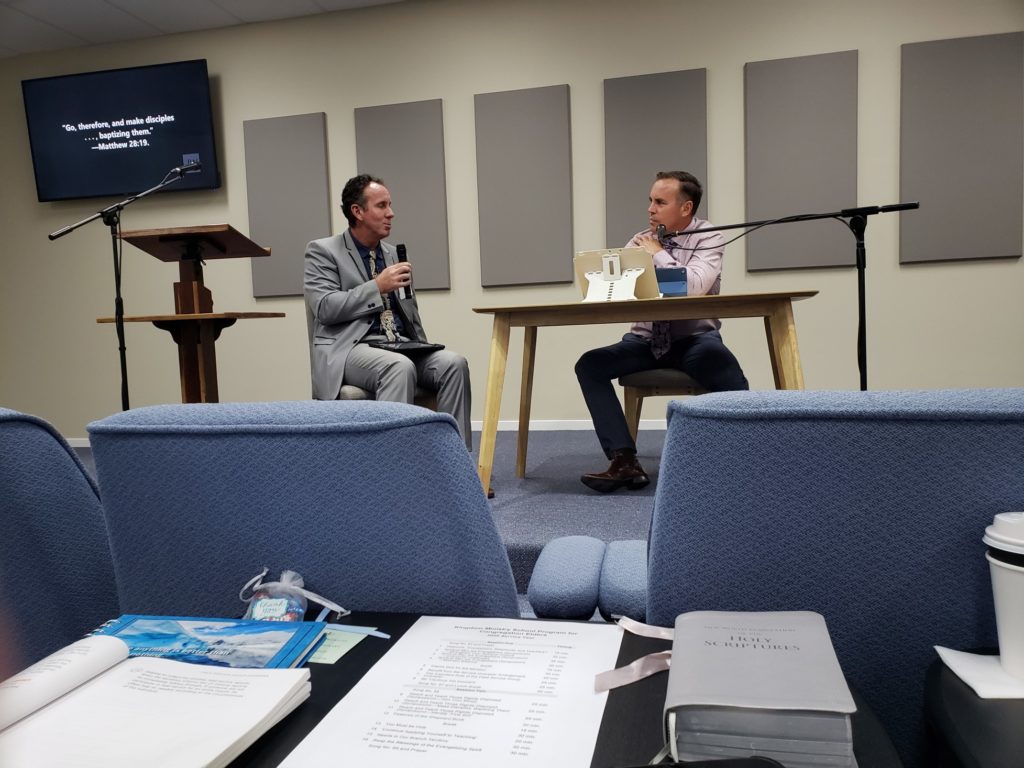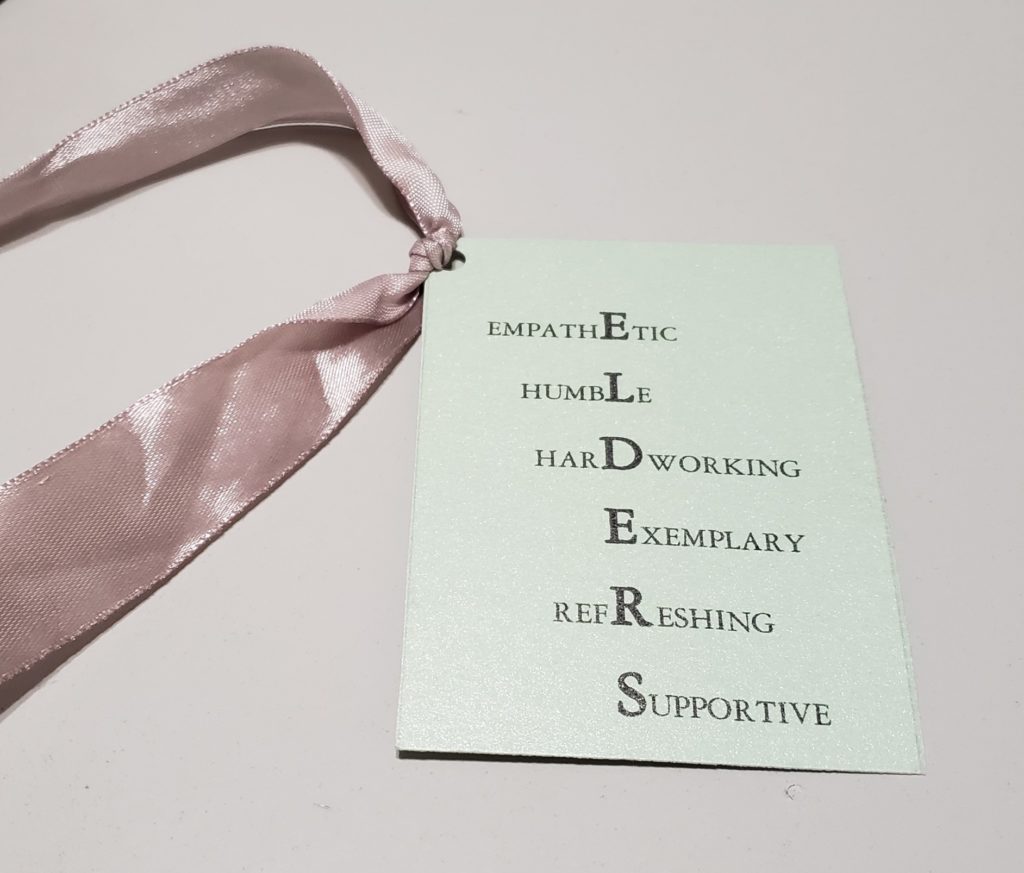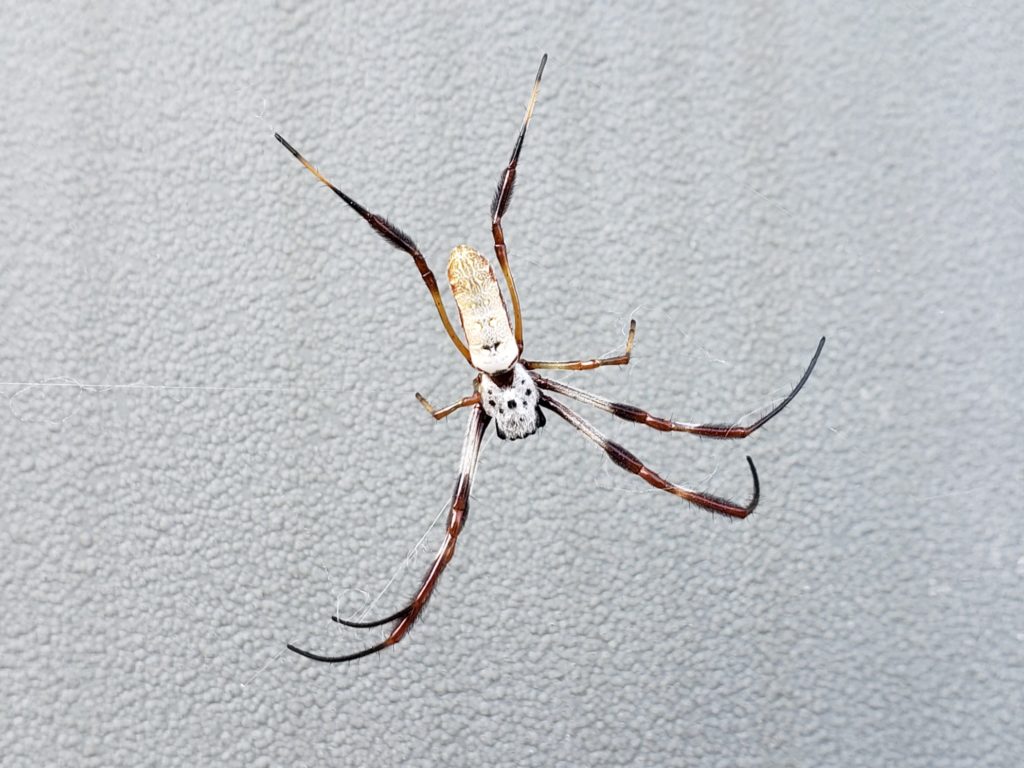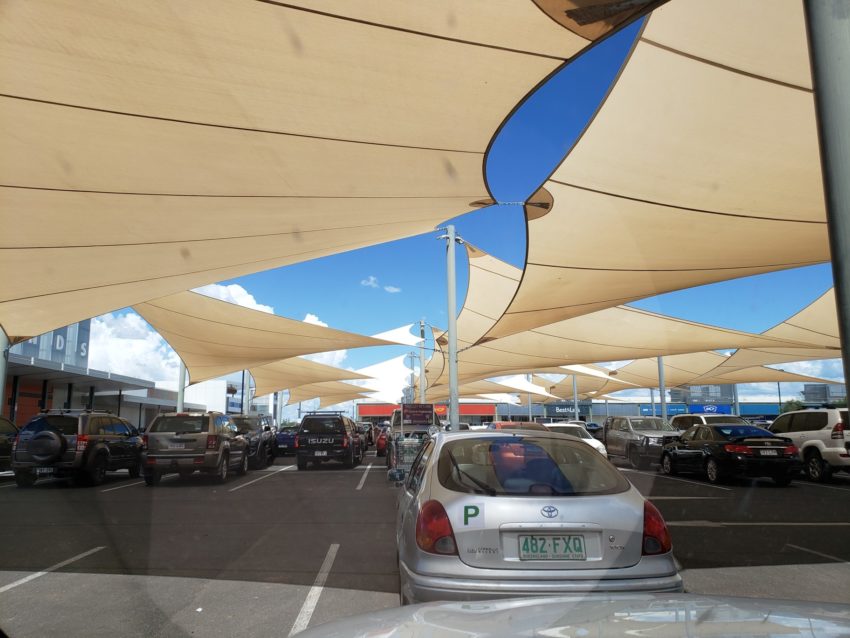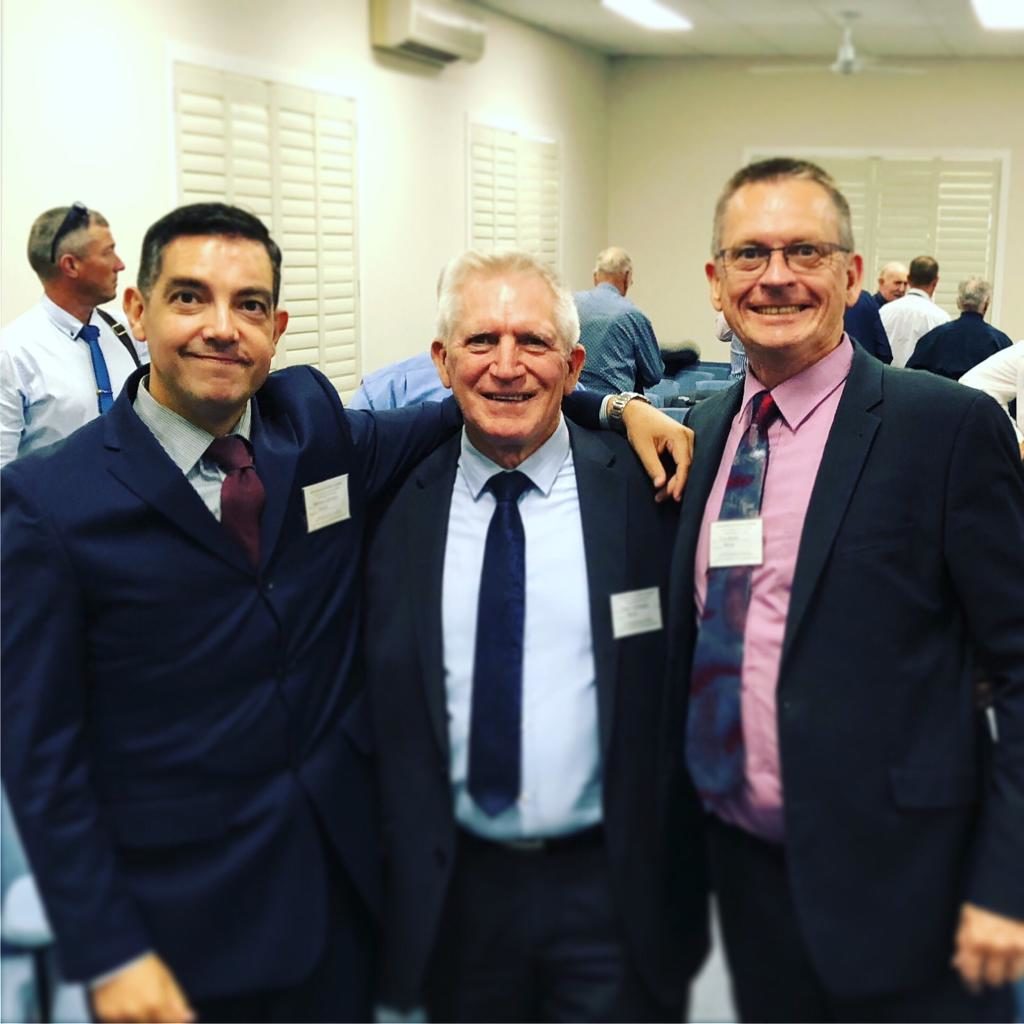
We stopped into the Central Highlands shopping Marketplace so that I could buy an ear bud/headset for a job I was supposed to start once we returned to Monto. (This would end up being one of two jobs I was hired for and immediately quit after the first class, despite being a bit hard up for work, but more on this in the future.) Like so many shopping centers here the parking lot was covered with huge awnings for shade. I got what I needed as well as a sandwich at Subway before we went on to the motel.
The Abode 37 was quite nice as motels go. My friends and I both had ground floor rooms next to each other as had been the case in Longreach. The room was clean, quiet, and comfortably appointed. Not only was there a full-sized refrigerator, but there was also a milk frother and milk, two complimentary coffee pods, a coffee maker, and of course a small complimentary gecko in the bathroom (who wasn’t interested in my company and quickly left). I was really very satisfied with it. And best of all NO bugs hovering around the lights at night!
As one does in a hotel room, I wanted to flip on the a/c and television immediately, just because I could. However after some fiddling, I realized that I couldn’t get anything to turn on. I even opened the fuse box in my room to see if anything needed flipped on, but all fuses were already engaged. Had this been an escape room, I likely would have conceded defeat at this point. So I walked over to the front office and asked if there was an issue with the power. At this point I was informed that my room key needed to be inserted into a small box next to the entry door of my room in order to engage the electricity. This blew my mind. Not only was it a fantastic way to save power (no blasting the a/c for hours in an empty room) but it was also a unique innovation and totally different from anything I had seen before. This was a country that took power conservation seriously. As mentioned in a previous post, generally each individual power socket here has its own switch so that no current is even sent to a socket that isn’t in use. Some even had a sort of timer to ensure that the power would be disconnected after a brief interval of use, in case you forgot to turn it off. From reusing grocery bags to rain barrels to solar panels, the idea of reducing waste will be one of my great take-aways when I one day depart Australia.
Tony and Michelle arrived later that day and we made a run to KFC and Maccas to pick up food. I think I must have really come to take fast food for granted after so many years of easy access, because now it had become a rare and special treat again. We ate with the Condoleons before returning to our rooms. I spent some time assembling a short highlight reel of the trip to Longreach before Tony showed up again so that we could watch some…wait for it…Seinfeld.
The next day was the KM School and the focus was to help us really improve our teaching abilities. As always, we were very well fed by the host congregation and many cheerful and generous volunteers. Tim was interviewed at one point and a few other brothers I knew gave parts. Tim later told me that his family would be visiting with Nigel Green’s (the brother with whom I had hiked that day in Cania), but I had already made tentative plans with Elmers and really just wanted a low key night anyways.
And low key it was. Condoleons spent the evening with family and the Elmers dropped by only briefly to play some Jackbox before leaving again.
The next morning we were on our way back to Monto. This time I would ride with the Elmers, but first we needed to stop for fuel. I dropped some postcards in the box across the parking lot outside of the shopping plaza entrance, the same one from two days before. On my way back to the Caltex, I very nearly walked face first into my worst nightmare.
Rather than walking around a sign and some bushes like a sensible person, I decided to take a short cut between the two. Mid lunge I suddenly realized what my face was about to plow into and lunged back as though shot by an unseen sniper. As a consequence of this reflexive move, I was able to save one of the effeminate shrieks I usually reserved only for special moments like this and instead took the opportunity to get some good pictures.
Though not known to bite humans, the Golden Orb Weaver spider has been known to kill small birds from time to time when they happen to get caught in its strong web. It was party because of this, and partly because it was a spider of any kind, that I didn’t want it on my face. This was a female and despite it’s arresting size (its body being about the size of a human finger with legs), they generally eat flying bugs such as mosquitoes, which later made me feel a certain warmth toward it. But not enough so that I wanted to put it on me, however. I suppose it’s because of watching too many black and white monster movies growing up, but I’ve always had an irrational fear of walking into spider webs, lest I end up like Al Hedison in The Fly and meet my end screaming ‘Help me!’ in a tiny voice as a great, dark, eight-legged shape descends upon me!
It seems Australia was determined to make a man out of me yet.
While travelling home, a song came on the radio. It was essentially a love song, but the lyrics were peppered with religious terms. At first I thought maybe it was a new original song, but soon realized it couldn’t be, due to the terminology being used. I asked if we were listening to something religious in the vein of Christian rock and suggested that maybe doing so was a bad idea. (It incidentally turned out to be Keith Urban’s latest offering, baited so as to hook North American rednecks.) The music was quickly stopped and apologies were immediately made. It was explained that I was the second American to make a comment like this while listening to a song, that hadn’t even registered to my hosts, as being of a religious nature. In the US we have what’s known as the ‘Bible belt’ (a portion of the Southern US where the residents are overtly religious) and other related terms, because people there are still very protective of their beliefs and religiosity, seeing these as an extension of their identities. As a result, people like myself are very aware of religious language. But here in Australia there’s nothing like that, so such things go over people’s heads, and often need to be pointed out.
This was an interesting insight, and the assertion was confirmed a week later when a visiting CO gave me a quick religious history of Australia as we strolled down a quiet street in field service one day. The information he gave has been subsequently augmented by much online research, but it went something like this:
Before the two world wars of the early 20th century, Australia had become a very religious country with Catholics and Protestants battling for the top spot. However that all changed after World War II ended, and there were many factors that lead to it.
For one thing, Christian denominations were largely supportive of the war effort, and even those who believed that killing was wrong still encouraged people to support what they viewed as a necessary evil. The religious leaders of the day viewed the Empire (under Mother England) and worship of ‘the God of battles’ to be connected, and therefore the defense of one was linked to faith in the other. However Australia suffered staggering losses in both wars: 60,000 died in WWI (15% of its population) and 40,000 in WWII. (The most notorious loss of life was at Gallipoli in 1915, where Australian forces suffered 28,000 casualties and 8,000 deaths in a poorly planned British invasion that accomplished absolutely nothing.) Up until that point it had been preached that heaven was on the side of the Allies and would therefore bestow victory (the same claim made by every other Christian nation in that war).
The problem is that after such an appalling loss of life in what were essentially back to back wars, serious religious doubts arose. As one report put it: “All churches faced questions of Theodicy (Why God permits evil), asking where God was in the face of the horrors of war”. Essentially, many people had lost, or were seriously questioning, their faith after 1945. And who could blame them after having been essentially lied to by their religious leaders on such a monumental scale. The result was a steady decline in religiosity in Australia.
From 96% in 1901, the latest numbers put those who claim to be Christian at only 52% today. In one poll, 32% of people claimed ‘no religion’ and in another poll 52% ‘believe religion divides us more than it unites us’. ‘Christian’ belief is a therefore shrinking in proportion to other religions, but not just because such beliefs are faltering.
In 1901 the so-called “White Australia” policy was instituted, which promised “Australia for Australians”. (“Australians” is here to be read as “white people of European descent”). This is, of course, a bit absurd since the original residents of the continent were still on hand and had markedly non-white skin. Nonetheless this policy barred non-Europeans from entering or settling in the country for decades. This policy finally began to be relaxed from 1949 into the early seventies when it was overturned, and by 1975 it had been completely abolished. Now the country is marked by its diversity of beliefs. Next to ‘Christian’ religions, the mostly notable are Orthodox, Buddhist, Islam, and Hinduism, this last seeing the sharpest rise in recent years.
The long and the short is that the response here is about the same as anywhere else, but this territory has its own unique challenges.
We saw some butterflies, bought some hot chips, and finally ended up back in Monto once more. It was now the end of February, and this would be the last trip before the Coronavirus restrictions kicked in and such adventures were curtailed for the next several months. To put this in perspective, this means that all of the adventures that have been chronicled here so far took place in the first four months of my stay in Oz, while the next four have been spent more or less sitting alone in a house blogging!
So don’t be too jealous. Though on one hand this trip has been a rousing success, on the other it has backfired spectacularly.

